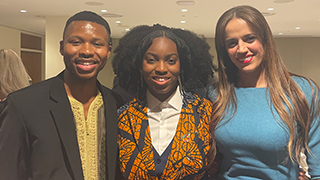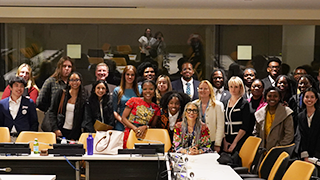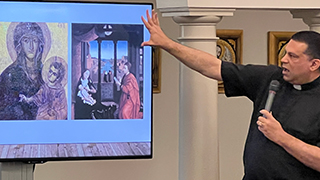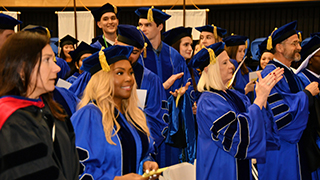Reflections on the International Day of Remembrance of the Victims of Slavery and the Transatlantic Slave Trade
Tuesday, May 20, 2025

(L-R): Diplomacy alumni Nicholas Kimble and Hanan Abu Salih with Salome Agbaroji, the 2023 National Youth Poet Laureate at the UN.
Each year, on March 25, the world pauses to observe the International Day of Remembrance of the Victims of Slavery and the Transatlantic Slave Trade, a day not only of remembrance but of education, reflection, and resolve. Established by the United Nations, this international observance honors the lives of millions of African men, women, and children who were ripped from their homes and made to suffer the evils of slavery. Yet, this day is not solely about remembrance. It's about responsibility. It's about change.
This year, that responsibility was embraced by Nicholas Kimble and Hanan Abu Salih, who represented the School of Diplomacy at the United Nations Headquarters in New York. Abu Salih, a graduate of the School of Diplomacy’s M.S. program and currently pursuing her Ph.D. in Higher Education Leadership, Management, and Policy, and Kimble, a graduating senior from the School of Diplomacy who will begin his Master of Public Administration at Cornell University, brought both academic insight and personal passion to the day’s events. They participated in a thought-provoking discussion with UN Poet Laureate Salome Agbaroji, engaging with themes of memory, justice and decolonization. Being there was not only a gesture of solidarity but an active contribution to the ongoing dialogue about historical reckoning and collective healing. In voicing their reflections, Abu Salih and Kimble helped illuminate how young leaders today are carrying forward the torch of remembrance with conviction and clarity of purpose.
The transatlantic slave trade, which continued from the fifteenth to the late nineteenth centuries, stands as one of the darkest chapters in human history. Driven by imperial ambition and greed for riches, it saw the violent trafficking of millions of enslaved Africans. Exploiting human beings enriched colonial powers but at a staggering and perpetual cost. To justify such violence, pseudo-ideologies of white superiority and Black inferiority were created — myths that still echo through the racial inequalities of our time.
Recognizing this painful history is a prerequisite to healing. As the UN recalls, the aim of this international day is threefold: recognize the past, repair the present and build a future of dignity and justice.

This year's observance at United Nations inspired a mighty chorus of voices ranging
from dignitaries and activists to writers and descendants of enslaved Africans, who
came together to reflect and reaffirm a global commitment to racial justice and truth.
Among the distinguished speakers was Nigeria's Nobel Laureate and global literary
giant, Wole Soyinka, who spoke on the urgency of memory and the danger of forgetting
with passion. His words were a call to arms: "Slavery will persist until we adopt
a holistic, comprehensive and egalitarian attitude.”
Kimble offered a reflection from the discussion: “To decolonize the mind is to reclaim the language of our truth and unshackle the imagination from borrowed visions. It is to speak in voices once silenced, to think in rhythms once erased, and to see liberation not as a gift, but as a birthright.”
Education as Liberation
The International Day of Remembrance is also a pedagogical imperative. Enslaved Africans
did not simply labor in chains; they built societies, developed economies, passed
on skills and preserved cultural traditions that shaped the modern Americas and the
entire globe. Their history is not peripheral but central. By placing this fact at
the forefront of the public imagination, we not only dignify their humanity, but we
also begin to address the legacies of racial injustice in our institutions and societies.
“When Salome said, ‘our books are banned, our voices are silenced,’ it deeply resonated with me,” Abu Salih shared. “I have seen how those in power can shape curricula and control narratives to promote one version of history while marginalizing others. Growing up in a Palestinian community in Israel, I witnessed how textbooks promoted a singular perspective that did not mention our identity or experience as Palestinians at all.”
Why March 25?
The day marks the anniversary of the passing of the Abolition of the Slave Trade Act
by the British Parliament on March 25, 1807. The act made the transatlantic slave
trade illegal, though it would be many years and many acts of resistance before slavery
itself was abolished throughout the Americas. One of the most potent symbols of that
resistance was the Haitian Revolution, which was waged by formerly enslaved people
who battled for and won their freedom, leading to the creation of the Republic of
Haiti in 1804, the world's first independent republic.
This legacy of resistance is a priority of the UN's Outreach Programme on the Transatlantic Slave Trade and Slavery and UNESCO's Routes of Enslaved Peoples Project. Both projects are committed to telling the whole story not of victimhood only but of survival, resilience, culture and contribution.
Looking Forward
Reflecting on this day, we are reminded that history does not lie behind us. It surrounds
us, is within us, and is still occurring. It is we who have to build the bridge between
memory and justice.
This International Day of Remembrance is a challenge to every one of us students, educators, leaders, and citizens to ensure that the victims of slavery are never forgotten and that their descendants have a world where dignity, equity, and truth are not goals but realities.
Let us respect the past. Let us repair the present. And let us build together a future deserving of those who endured the unspeakable and still arose.
Categories: Nation and World





